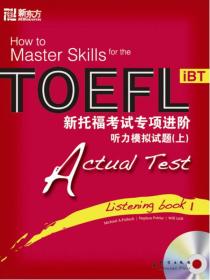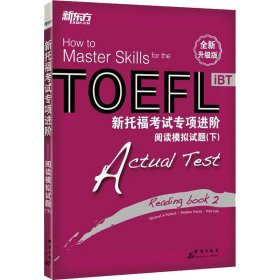
新托福考试专项进阶:初级口语9787800809729
正版图书,可开发票,请放心购买。
¥ 30.11 6.3折 ¥ 48 全新
库存2件
作者[美]Arthur H.Milch,[美]Denise McCormack,Jasmine C.Swaney
出版社群言出版社
ISBN9787800809729
出版时间2008-03
装帧平装
开本16开
定价48元
货号10808191
上书时间2024-12-14
- 店主推荐
- 最新上架
商品详情
- 品相描述:全新
- 商品描述
-
前言
Introduction
.
Information on the TOEFL® iBT The Format of the TOEFL® iBTSection
Number of Questions
Timing
Score
Reading
• 3~4 Passages
- approximately 700 words each
- 10 questions per passage
54~72 min.
30 points
Listening
• 2~3 Conversations
- 12~25 exchanges each (3 min.)
- 5 questions per conversation
• 3~4 Lectures
- 500~750 words each (4~5 min.)
- 6 questions per lecture
41~57 min.
30 points
BREAK
10 min.
Speaking
• 1 Independent Task
(preparation: 15 sec. / response: 45 sec.)
① 1 paired choice
• 2 Integrated Tasks: Read-Listen-Speak
(preparation: 30 sec. / response: 60 sec.)
① 1 campus situation topic
- reading: 80~110 words (45 sec.)
- conversation: 150~180 words (60~80 sec.)
② 1 academic course topic
- reading: 80~110 words (45 sec.)
- lecture: 150~220 words (60~90 sec.)
• 1 Integrated Task: Listen-Speak
(preparation: 20 sec. / response: 60 sec.)
① 1 academic course topic
- lecture: 230~280 words (90~120 sec.)
17 min.
30 points
Writing
• 1 Integrated Task: Read-Listen-Write (20 min.)
- reading: 250~300 words (3 min.)
- lecture: 250~320 words (2 min.)
- a summary of 150~225 words
• 1 Independent Task (30 min.)
- a minimum 300-word essay
50 min.
30 points
Information on the Speaking SectionThe Speaking section of the TOEFL® iBT measures test takers’ English speaking proficiency. This section takes approximately 17 minutes and has four questions. The first question is called Independent Speaking Task, and you will be asked to speak about a familiar topic based on your personal preference. The remaining three questions are Integrated Speaking Tasks, and you will be required to integrate different language skills—listening and speaking or listening, reading, and speaking.
Types of Speaking Tasks[ Independent Task ]
Task 1: Personal Preference
_ This task will ask you to make and defend a personal choice between two possible opinions, actions, or situations. You should justify your choice with reasons and details.
_ You will be given 15 seconds to prepare your answer and 45 seconds to say which of the two options you think is preferable.
[ Integrated Tasks ]
Task 2: Reading & Conversation
_ This task will ask you to respond to a question based on what you have read and heard. You will first read a short passage presenting a campus-related issue and will then listen to a dialogue on the same topic. Then, you will be asked to summarize one speaker’s opinion within the context of the reading passage.
_ You will be given 30 seconds to prepare your answer and 60 seconds to speak on the question. You should be careful not to express your own opinion in your response.
Task 3: Reading & Lecture
_ This task also asks you to respond to a question based on what you have read and heard. You will first read a short passage about an academic subject and will then listen to an excerpt from a lecture on that subject. Then, you will be asked to combine and convey important information from both the reading passage and the lecture.
_ You will be given 30 seconds to prepare your answer and 60 seconds to speak on the question.
Task 4: Lecture
_ In this task, you will first listen to an excerpt from a lecture that explains a term or concept and gives some examples to illustrate it. Then, you will be asked to summarize the lecture and explain how the examples are connected with the overall topic.
_ You will be given 20 seconds to prepare your answer and 60 seconds to respond to the question.
Types of Speaking Topics(1) Personal Preference
_ Questions in Task 1 will be about everyday issues of general interest to test takers. For example, a question may ask about a preference between studying at home and at the library, a preference between living in a dormitory and an off-campus apartment, or a preference between a class with a lot of discussion and one without discussion.
(2) Campus Situations
_ Questions in Task 2 will be about campus-related issues. For example, a question may ask about a university policy, rule, or procedure, future university plans, campus facilities, or the quality of life on campus.
(3) Academic Course Content
_ Questions in Task 3 will be about academic subjects. For example, a question may ask about a life science, a social science, a physical science, or a topic in the humanities like animal domestication or economics.
_ Questions in Task 4 will also be about academic-related topics. For example, a question may ask about a process, a method, a theory, an idea, or a phenomenon of any type in fields like natural science, social science, or psychology.
Important Features of Evaluation(1) Delivery
Delivery means how clear your speech is. In order to get good grades on the speaking tasks, you should speak smoothly and clearly, have good pronunciation, pace yourself naturally, and have natural-sounding intonation patterns.
(2) Language Use
Language use is about the effectiveness of your use of grammar and vocabulary to express your ideas. In order to get good grades on the speaking tasks, you should be able to use both basic and more complex language structures and choose the appropriate words.
(3) Topic Development
Topic development is related to how fully you respond to the question and how coherently you give your ideas. In order to get good grades on the speaking test, you should make sure that the relationship between your ideas and your progression from one idea to the next is clear and easy to follow.
商品简介“新托福考试专项进阶”系列丛书引进自韩国多乐园出版社,从托福考试所考查的听、说、读、写四项技能入手,为考生提供了详尽的考试指导,并将各技能分为初、中、高三级,通过独特的“进阶训练”方式,再辅以大量练习,让考生逐步掌握托福实考的技巧,同时切实提高英语实际运用能力,从而在短期内轻松取得托福高分。本丛书内容编排由易到难,循序渐进,实战性强,是不可多得的托福备考资料。
本丛书根据2019年托福考试改革信息全新改版升级,适用于改革后的托福备考及学习。
作者简介
Arthur H. Milch,毕业于新泽西州立大学,教育学硕士。
Denise McCormack,毕业于新泽西州立大学,语言学硕士。
Jasmine C. Swaney,毕业于宾夕法尼亚大学,教育学硕士。
目录
Contents
Introduction
How to Use This Book
PART 1 Independent Speaking
Chapter 1 Personal Preference
Unit 1 Education 6
Unit 2 Life 10
Unit 3 School 14
Unit 4 Multimedia 18
PART 2 Integrated Speaking I
Chapter 2 Reading & Conversation
Unit 5 School Facilities 30
Unit 6 Cafeterias & Computer Labs 36
Unit 7 School Events & Policies 42
Unit 8 School Systems 48
Chapter 3 Reading & Lecture
Unit 9 Psychology I 60
Unit 10 Psychology II & Economics 66
Unit 11 Architecture & Arts 72
Unit 12 Biology 78
PART 3 Integrated Speaking II
Chapter 4 Lecture
Unit 13 Economics 92
Unit 14 Biology 98
Unit 15 Psychology 104
Unit 16 Others 110
Expressions & Collocations 116
Actual Tests 129
Contents(Answer Book)
Chapter 1 Personal Preference
Unit 1 Education 147
Unit 2 Life 148
Unit 3 School 150
Unit 4 Multimedia 151
Chapter 2 Reading & Conversation
Unit 5 School Facilities 154
Unit 6 Cafeterias & Computer Labs 157
Unit 7 School Events & Policies 160
Unit 8 School Systems 164
Chapter 3 Reading & Lecture
Unit 9 Psychology I 168
Unit 10 Psychology II & Economics 171
Unit 11 Architecture & Arts 175
Unit 12 Biology 178
Chapter 4 Lecture
Unit 13 Economics 182
Unit 14 Biology 185
Unit 15 Psychology 188
Unit 16 Others 191
Actual Tests 193
内容摘要
“新托福考试专项进阶”系列丛书引进自韩国多乐园出版社,从托福考试所考查的听、说、读、写四项技能入手,为考生提供了详尽的考试指导,并将各技能分为初、中、高三级,通过独特的“进阶训练”方式,再辅以大量练习,让考生逐步掌握托福实考的技巧,同时切实提高英语实际运用能力,从而在短期内轻松取得托福高分。本丛书内容编排由易到难,循序渐进,实战性强,是的托福备考资料。
主编推荐
《新托福考试专项进阶——初级口语》属于“新托福考试专项进阶”系列图书中的口语专项。书中包括4个单元的内容,详细剖析托福口语4类题型的备考技巧,每单元都配有丰富的练习题,书末提供两套托福口语模考题。所有题目都配有回答范例及参考译文。书中全部题目均配有MP3音频,专业外教录制,地道美式发音。扫描封底的“音频”二维码或登录封底提供的链接即可免费获取音频文件。本书内容相对比较基础,属于托福口语入门级别的备考用书,适合托福考试初学者。该系列图书中另有“中级口语”和“高级口语”供更高学习水平的读者选择。
精彩内容
“新托福考试专项进阶”系列丛书引进自韩国多乐园出版社,从托福考试所考查的听、说、读、写四项技能入手,为考生提供了详尽的考试指导,并将各技能分为初、中、高三级,通过独特的“进阶训练”方式,再辅以大量练习,让考生逐步掌握托福实考的技巧,同时切实提高英语实际运用能力,从而在短期内轻松取得托福高分。本丛书内容编排由易到难,循序渐进,实战性强,是不可多得的托福备考资料。 本丛书根据2019年托福考试改革信息全新改版升级,适用于改革后的托福备考及学习。
媒体评论
《新托福考试专项进阶——初级口语》属于“新托福考试专项进阶”系列图书中的口语专项。书中包括4个单元的内容,详细剖析托福口语4类题型的备考技巧,每单元都配有丰富的练习题,书末提供两套托福口语模考题。所有题目都配有回答范例及参考译文。
书中全部题目均配有MP3音频,专业外教录制,地道美式发音。扫描封底的“音频”二维码或登录封底提供的链接即可免费获取音频文件。
本书内容相对比较基础,属于托福口语入门级别的备考用书,适合托福考试初学者。该系列图书中另有“中级口语”和“高级口语”供更高学习水平的读者选择。
相关推荐
— 没有更多了 —


























以下为对购买帮助不大的评价